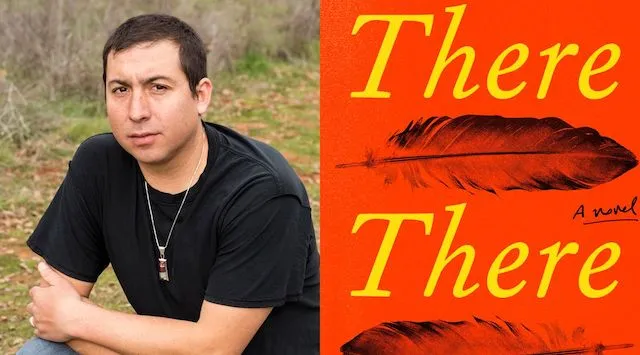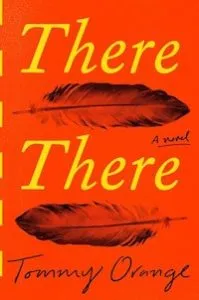
THERE THERE Book Club Questions: A Reading Guide
This content contains affiliate links. When you buy through these links, we may earn an affiliate commission.
Are you looking for There There book club questions to get the conversation started? And what makes Tommy Orange’s There There such a great book club pick? Read on to find out.
 There There is Cheyenne and Arapaho author Tommy Orange’s debut novel. It was published in the United States on June 5, 2018, and has since received multiple awards: the 2018 Center for Fiction First Novel Prize, the 2018 John Leonard Prize, the 2019 Anisfield-Wolf Book Award for Fiction, and the 2019 Hemingway Fountain/PEN award, just to name a few. The New York Times called Tommy Orange’s debut novel “groundbreaking,” and said that Tommy Orange had an “extraordinary ability to invest a series of interlocking character sketches with the troubled history of his displaced people.”
Bottom line: people are loving There There, and your book club probably will too.
There There is Cheyenne and Arapaho author Tommy Orange’s debut novel. It was published in the United States on June 5, 2018, and has since received multiple awards: the 2018 Center for Fiction First Novel Prize, the 2018 John Leonard Prize, the 2019 Anisfield-Wolf Book Award for Fiction, and the 2019 Hemingway Fountain/PEN award, just to name a few. The New York Times called Tommy Orange’s debut novel “groundbreaking,” and said that Tommy Orange had an “extraordinary ability to invest a series of interlocking character sketches with the troubled history of his displaced people.”
Bottom line: people are loving There There, and your book club probably will too.
 There There is Cheyenne and Arapaho author Tommy Orange’s debut novel. It was published in the United States on June 5, 2018, and has since received multiple awards: the 2018 Center for Fiction First Novel Prize, the 2018 John Leonard Prize, the 2019 Anisfield-Wolf Book Award for Fiction, and the 2019 Hemingway Fountain/PEN award, just to name a few. The New York Times called Tommy Orange’s debut novel “groundbreaking,” and said that Tommy Orange had an “extraordinary ability to invest a series of interlocking character sketches with the troubled history of his displaced people.”
Bottom line: people are loving There There, and your book club probably will too.
There There is Cheyenne and Arapaho author Tommy Orange’s debut novel. It was published in the United States on June 5, 2018, and has since received multiple awards: the 2018 Center for Fiction First Novel Prize, the 2018 John Leonard Prize, the 2019 Anisfield-Wolf Book Award for Fiction, and the 2019 Hemingway Fountain/PEN award, just to name a few. The New York Times called Tommy Orange’s debut novel “groundbreaking,” and said that Tommy Orange had an “extraordinary ability to invest a series of interlocking character sketches with the troubled history of his displaced people.”
Bottom line: people are loving There There, and your book club probably will too.
There There: Your Reading Guide
There There follows 12 Native American characters living in and around Oakland, California. Each of these characters have their own conflicts—alcoholism, abusive relationships, financial strife, and grief and loss, just to name a few. All of them are, in some way, dealing with their identity as a Native American. Eventually, all the characters and their storylines come together at the first Big Oakland Pow Wow. Tommy Orange was also raised in the Oakland area, and the author has said that he identifies with all 12 of his characters in one way or another. In this novel, Orange confronts themes important to contemporary Native Americans, such as generational trauma and life as a Native American in an urban setting. In addition, the novel explores many other concepts: storytelling and its importance to Native American culture; coincidence, fate, and the interconnectedness of all things; violence; substance abuse and addiction; personal identity versus cultural identity; the concept of home.10 There There Book Club Questions
There are so many topics to unpack in Orange’s debut novel. Here are ten book club questions to get you started, but there are so many other things to discuss in this novel beyond this list.- There There starts with a prologue: a nonfiction essay about the Native American experience. Similarly, there’s a nonfiction interlude on pages 134–141. Why do you think the author opened with this prologue and included the interlude? And how did it inform your reading of the novel?
- Of the 12 central characters the novel follows, were there some storylines that you enjoyed or cared about more than the others? If so, what about those characters made their story stand out?
- Why do you think Orange chose to tell this story from so many different perspectives? And why were some told from a first person perspective while others were third person? Was it ever challenging to follow so many storylines before they began to converge?










